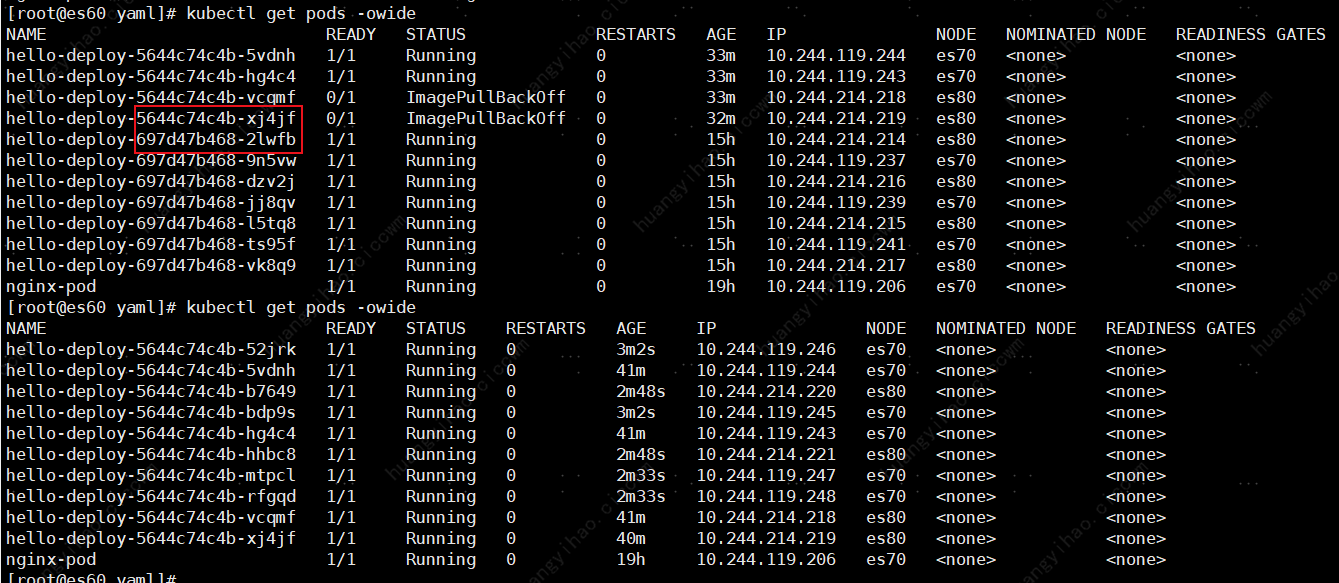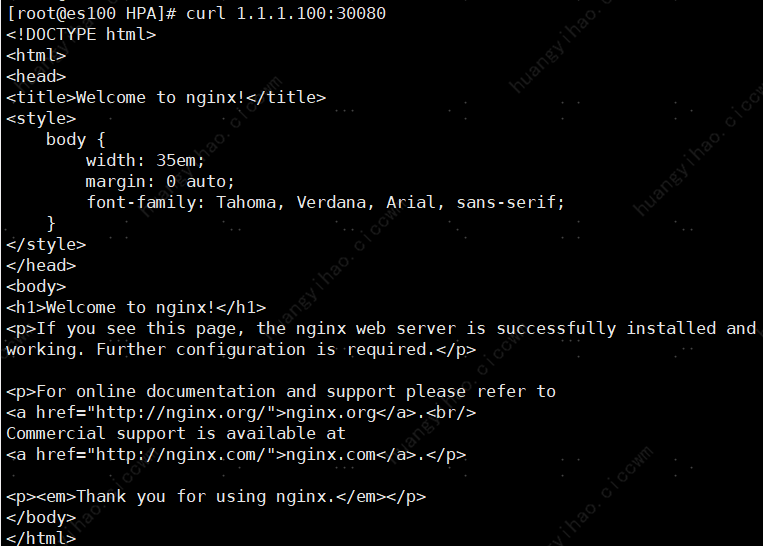目录
创建第一个pod
bash
kubectl create deployment nginx-deploy --image=nginx
kubectl get pod -o wide # 查看 pod
kubectl expose deployment nginx-deploy --port=80 --type=NodePort # 暴露 deployment
kubectl get service nginx-deploy # 查看 service
kubectl delete deployment nginx-deploy # 删除 deployment
kubectl delete service nginx-deploy # 删除 service
kubectl get pod nginx-deploy-8cc8b9c49-xshrr -o yaml
kubectl get pod nginx-deploy-8cc8b9c49-xshrr -o wide
kubectl describe pods nginx-deploy-8cc8b9c49-xshrr
kubectl exec -it nginx-deploy-8cc8b9c49-xshrr -- sh
kubectl logs nginx-deploy-8cc8b9c49-xshrr创建Deployment
vi deployment.yaml
yaml
apiVersion: apps/v1
kind: Deployment
metadata:
name: nginx-deploy # Deployment名称
spec:
replicas: 2 # 期望的Pod副本数
selector:
matchLabels:
app: nginx # 选择所有包含app=nginx标签的Pod
minReadySeconds: 2 # Pod准备就绪前需要等待的最小秒数
strategy:
type: RollingUpdate # 更新策略为滚动更新
rollingUpdate:
maxUnavailable: 1 # 滚动更新期间最多允许1个Pod不可用
maxSurge: 1 # 滚动更新期间最多允许额外创建1个Pod
template:
metadata:
labels:
app: nginx # Pod的标签
spec:
containers:
- name: nginx-pod # 容器名称
image: nginx:1.13.0 # 使用的镜像
imagePullPolicy: IfNotPresent # 优先使用本地镜像,不存在时才拉取
ports:
- containerPort: 80 # 容器内部监听的端口,官方的nginx镜像默认配置为监听 80 端口,而非 8080。即使这里配置的是8080,访问的时候仍然需要使用80端口。
resources: # 后续HPA会用到资源限制
limits:
cpu: "100m" # CPU限制为100毫核
requests:
cpu: "50m" # CPU请求为50毫核
bash
kubectl apply -f deployment.yaml
kubectl get deployment nginx-deploy -owide
NAME READY UP-TO-DATE AVAILABLE AGE CONTAINERS IMAGES SELECTOR
nginx-deploy 2/2 2 2 178m nginx-pod nginx:1.13.0 app=nginx
kubectl get rs -owide
NAME DESIRED CURRENT READY AGE CONTAINERS IMAGES SELECTOR
nginx-deploy-68ff6f9d47 2 2 2 151m nginx-pod nginx:1.13.0 app=nginx,pod-template-hash=68ff6f9d47滚动升级和回滚
bash
vi deployment.yaml
image: nginx:1.13.0 >> image: nginx:latest # 修改镜像版本
kubectl apply -f deployment.yaml --record=true # 记录此次更新,以便日后回滚
kubectl rollout status deployment nginx-deploy # 查看滚动升级状态
# 回滚到上一个版本(无需指定版本号)
kubectl rollout undo deployment nginx-deploy
# 或回滚到指定版本(需确认版本号存在)
kubectl rollout undo deployment nginx-deploy --to-revision=1
kubectl rollout status deployment nginx-deploy # 查看回滚状态
创建serivce
vi service.yaml
yaml
apiVersion: v1
kind: Service
metadata:
name: nginx-svc # Service的名称,在同一个命名空间内必须唯一
labels:
app: nginx
spec:
type: NodePort
ports:
- port: 80 # Service 在集群内部的端口(其他 Pod 通过此端口访问该服务)
nodePort: 30080 # 节点上暴露的端口,外部可通过 <NodeIP>:30080 访问服务,范围是30000-32767。
protocol: TCP
selector:
app: nginx # selector下的app标签要和Pod的label一致
bash
kubectl apply -f service.yaml
以下两个地方要注意,要保持一致
service.yaml --> spec.selector
deployment.yaml --> spec.template.metadata.labels
bash
kubectl describe svc nginx-svc
Name: nginx-svc
Namespace: default
Labels: app=nginx
Annotations: <none>
Selector: app=nginx
Type: NodePort
IP Family Policy: SingleStack
IP Families: IPv4
IP: 10.100.160.27
IPs: 10.100.160.27
Port: <unset> 80/TCP
TargetPort: 80/TCP
NodePort: <unset> 30080/TCP
Endpoints: 10.240.214.207:80,10.240.214.208:80
Session Affinity: None
External Traffic Policy: Cluster
Events: <none>Endpoint 是Service和Pod之间的桥梁,它记录了哪些Pod可以被访问。
访问Service
Service 的网络标识:ClusterIP、DNS 名称
bash
kubectl get svc
NAME TYPE CLUSTER-IP EXTERNAL-IP PORT(S) AGE
kubernetes ClusterIP 10.96.0.1 <none> 443/TCP 43h
nginx-svc NodePort 10.100.160.27 <none> 80:30080/TCP 18hNAME: nginx-svc
CLUSTER-IP: 10.100.160.27
PORT:80
NodePort: 30080
从集群内部,可以通过前3个值(Name、ClusterIP、port)来直接访问
从集群外部,可以通过NodeIP:NodePort来访问
curl 10.100.160.27:80 # 集群内部访问Service
curl nginx-svc:80 # Pod内部通过DNS访问Service
curl 1.1.1.100:30080 # 集群外部访问Service es100:30800

HPA
前提条件:部署nginx,可参考上面的Deployment和Service部分
vi metric-server.yaml
yaml
apiVersion: v1
kind: ServiceAccount
metadata:
labels:
k8s-app: metrics-server
name: metrics-server
namespace: kube-system
---
apiVersion: rbac.authorization.k8s.io/v1
kind: ClusterRole
metadata:
labels:
k8s-app: metrics-server
rbac.authorization.k8s.io/aggregate-to-admin: "true"
rbac.authorization.k8s.io/aggregate-to-edit: "true"
rbac.authorization.k8s.io/aggregate-to-view: "true"
name: system:aggregated-metrics-reader
rules:
- apiGroups:
- metrics.k8s.io
resources:
- pods
- nodes
verbs:
- get
- list
- watch
---
apiVersion: rbac.authorization.k8s.io/v1
kind: ClusterRole
metadata:
labels:
k8s-app: metrics-server
name: system:metrics-server
rules:
- apiGroups:
- ""
resources:
- nodes/metrics
verbs:
- get
- apiGroups:
- ""
resources:
- pods
- nodes
verbs:
- get
- list
- watch
---
apiVersion: rbac.authorization.k8s.io/v1
kind: RoleBinding
metadata:
labels:
k8s-app: metrics-server
name: metrics-server-auth-reader
namespace: kube-system
roleRef:
apiGroup: rbac.authorization.k8s.io
kind: Role
name: extension-apiserver-authentication-reader
subjects:
- kind: ServiceAccount
name: metrics-server
namespace: kube-system
---
apiVersion: rbac.authorization.k8s.io/v1
kind: ClusterRoleBinding
metadata:
labels:
k8s-app: metrics-server
name: metrics-server:system:auth-delegator
roleRef:
apiGroup: rbac.authorization.k8s.io
kind: ClusterRole
name: system:auth-delegator
subjects:
- kind: ServiceAccount
name: metrics-server
namespace: kube-system
---
apiVersion: rbac.authorization.k8s.io/v1
kind: ClusterRoleBinding
metadata:
labels:
k8s-app: metrics-server
name: system:metrics-server
roleRef:
apiGroup: rbac.authorization.k8s.io
kind: ClusterRole
name: system:metrics-server
subjects:
- kind: ServiceAccount
name: metrics-server
namespace: kube-system
---
apiVersion: v1
kind: Service
metadata:
labels:
k8s-app: metrics-server
name: metrics-server
namespace: kube-system
spec:
ports:
- name: https
port: 443
protocol: TCP
targetPort: https
selector:
k8s-app: metrics-server
---
apiVersion: apps/v1
kind: Deployment
metadata:
labels:
k8s-app: metrics-server
name: metrics-server
namespace: kube-system
spec:
selector:
matchLabels:
k8s-app: metrics-server
strategy:
rollingUpdate:
maxUnavailable: 0
template:
metadata:
labels:
k8s-app: metrics-server
spec:
containers:
- args:
- --cert-dir=/tmp
- --secure-port=4443
- --kubelet-preferred-address-types=InternalIP,ExternalIP,Hostname
- --kubelet-use-node-status-port
- --metric-resolution=15s
- --kubelet-insecure-tls
image: swr.cn-north-4.myhuaweicloud.com/ddn-k8s/registry.k8s.io/metrics-server/metrics-server:v0.6.4
imagePullPolicy: IfNotPresent
livenessProbe:
failureThreshold: 3
httpGet:
path: /livez
port: https
scheme: HTTPS
periodSeconds: 10
name: metrics-server
ports:
- containerPort: 4443
name: https
protocol: TCP
readinessProbe:
failureThreshold: 3
httpGet:
path: /readyz
port: https
scheme: HTTPS
initialDelaySeconds: 20
periodSeconds: 10
resources:
requests:
cpu: 100m
memory: 200Mi
securityContext:
allowPrivilegeEscalation: false
readOnlyRootFilesystem: true
runAsNonRoot: true
runAsUser: 1000
volumeMounts:
- mountPath: /tmp
name: tmp-dir
nodeSelector:
kubernetes.io/os: linux
priorityClassName: system-cluster-critical
serviceAccountName: metrics-server
volumes:
- emptyDir: {}
name: tmp-dir
---
apiVersion: apiregistration.k8s.io/v1
kind: APIService
metadata:
labels:
k8s-app: metrics-server
name: v1beta1.metrics.k8s.io
spec:
group: metrics.k8s.io
groupPriorityMinimum: 100
insecureSkipTLSVerify: true
service:
name: metrics-server
namespace: kube-system
version: v1beta1
versionPriority: 100
bash
kubectl apply -f metric-server.yaml
kubectl autoscale deployment nginx-deploy --cpu-percent=50 --min=2 --max=10 # 创建HPA,自动扩容,CPU使用率超过50%,最小2个Pod,最大10个Pod
horizontalpodautoscaler.autoscaling/nginx-deploy autoscaled # 查看HPA状态测试开始:使用一下Python代码进行连接模拟
原本是来模拟http版本请求的,凑合着用吧
python
import time
import httpx
import ssl
while True:
with httpx.Client(http2=False, verify=False) as client: # http2=True则使用 HTTP2,http2=False,则默认采用 HTTP/1.1 协议
response = client.get('http://1.1.1.100:30080', headers={'Host': url})
response = client.get('http://1.1.1.80:30080', headers={'Host': url})
time.sleep(1) # 这里可以自由调节,间隔越小,CPU使用率越高观测结果:
bash
kubectl get hpa nginx-deploy --watch # 观察HPA自动扩容
kubectl get pod
NAME READY STATUS RESTARTS AGE
nginx-deploy-74db4c6d6f-65lzx 1/1 Running 0 16h
nginx-deploy-74db4c6d6f-kzwvn 1/1 Running 0 5m11s
nginx-deploy-74db4c6d6f-xf99c 1/1 Running 0 16h
nginx-deploy-74db4c6d6f-xv9hc 1/1 Running 0 5m11s
kubectl get hpa nginx-deploy --watch
NAME REFERENCE TARGETS MINPODS MAXPODS REPLICAS AGE
nginx-deploy Deployment/nginx-deploy 0%/50% 2 10 2 19h
nginx-deploy Deployment/nginx-deploy 38%/50% 2 10 2 19h
nginx-deploy Deployment/nginx-deploy 92%/50% 2 10 2 19h
nginx-deploy Deployment/nginx-deploy 106%/50% 2 10 4 19h
nginx-deploy Deployment/nginx-deploy 72%/50% 2 10 4 19h
nginx-deploy Deployment/nginx-deploy 0%/50% 2 10 4 19h
nginx-deploy Deployment/nginx-deploy 0%/50% 2 10 4 19h
nginx-deploy Deployment/nginx-deploy 0%/50% 2 10 2 19h